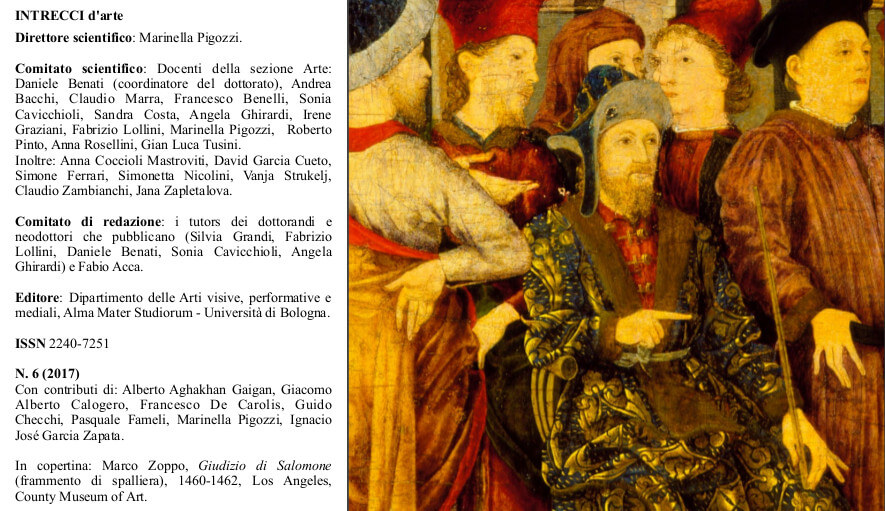«Non tanto per el guadagno quanto per l’onore». Marco Zoppo, the italian courts and the humanists
DOI:
https://doi.org/10.6092/issn.2240-7251/7655Keywords:
Marco Zoppo, Felice Feliciano, Raffaele Zovenzoni, Bartolomeo Sanvito, Giovanni Marcanova, Quaedam antiquitatum fragmenta, Rosebery’s album, Humanism, italian courts of 1400Abstract
Through a comprehensive speech so far never carried out, this article intends to reconstract the close web of human and professional relations maintain by Marco Ruggeri, known as Lo Zoppo (1432/33 - 1478) with humanists, his contemporary literates and major courts in northen Italy. Zoppo was close to prominent humanists from northen Italy, in the same way of Andrea Mantegna, his main colleague: Felice Feliciano, the antiquarius from Verona, the humanist doctor Giovanni Marcanova, Marcantonio Morosini, the patrician from Venezia, Raffaele Zovenzoni, the poet from Trieste and Giovanni Testa Cillenio, the Petrarcan rhymer, for instance. Those erudites frequentations are attest to letters and appreciative mentions in poems and they influence the matter and the creative modalities of Zoppo's art.
The painter from Emilia was often engaged, as illustrator, in eminent tall orders about books and others ornamental works. Marco Zoppo was hightly regarded for his dowers of inventio, that are clearly visible into his ample and various drawings corpus. He was also a worthy exponent of the renovate fascinating for the antique, that captivates an entire generation of padani artists and clients from the second half of XV century.
Downloads
Published
How to Cite
Issue
Section
License
Copyright (c) 2017 Giacomo Alberto Calogero
The copyrights of all the texts on this journal belong to the respective authors without restrictions.
This journal is licensed under a Creative Commons Attribution 4.0 International License (full legal code).
See also our Open Access Policy.
Images and photographs may have different terms of license.
In making material available online the Journal acts in good faith. Parties who have questions or who wish to contest the use of specific works may contact the Editor in chief.
Metadata
All the metadata of the published material is released in the public domain and may be used by anyone free of charge. This includes references.
Metadata — including references — may be re-used in any medium without prior permission for both not-for-profit and for-profit purposes. We kindly ask users to provide a link to the original metadata record.






